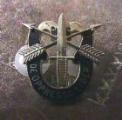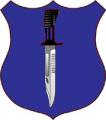That was pretty much the point I was trying to get at in my ham fisted way, Ken. Basically, if you have a "book" then people who don't know better will think that you can do StabOps, and the activists amongst them will think that you should do them (think Darfur for an example). Whether we look at them as textbooks (here's how you do it), capabilities statements (look, we can do it) or political works (here is why you do it), they will be misread by a lot of people... including politicians!
ps. And yes, I do think that thinking in advance is an excellent idea, Tom.













 A particularly interesting linguistic example from English v Spanish is the verb to compromise. In English it can mean to become committed or to reach an agreement where each sid gives up something. In Spanish the only meaning of comprometer is to become committed. Kind of like being a littel pregnant - uh, embarasada - embarrassed
A particularly interesting linguistic example from English v Spanish is the verb to compromise. In English it can mean to become committed or to reach an agreement where each sid gives up something. In Spanish the only meaning of comprometer is to become committed. Kind of like being a littel pregnant - uh, embarasada - embarrassed 


Bookmarks